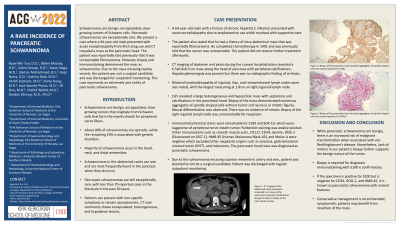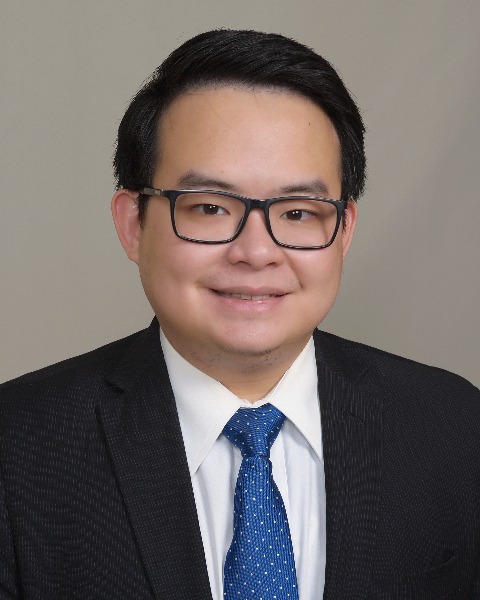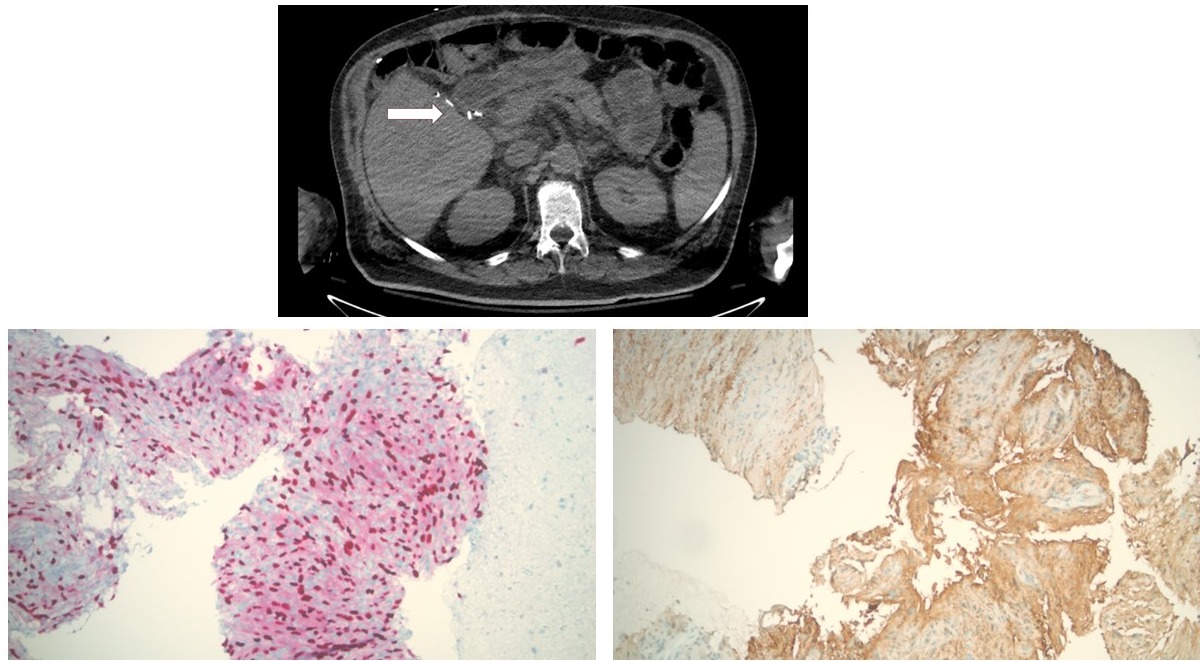Back


Poster Session A - Sunday Afternoon
Category: Biliary/Pancreas
A0070 - A Rare Incidence of Pancreatic Schwannoma
Sunday, October 23, 2022
5:00 PM – 7:00 PM ET
Location: Crown Ballroom

Has Audio

Kyaw Min Tun, DO
Kirk Kerkorian School of Medicine at UNLV
Las Vegas, NV
Presenting Author(s)
Kyaw Min Tun, DO1, Yassin Naga, MD1, Blaine Massey, DO1, Zahra Dossaji, DO1, Salman Mohammed, BS1, Sami Mesgun, BS1, Osman Rahimi, DO1, Gopi Narra, DO1, Katrina Naik, MD1, Amith Subhash, MD1, Annie Hong, MD1, Jill Ono, MD2, Jose Aponte-Pieras, MD1, Shahid Wahid, MD1, Gordon Ohning, MD, PhD1
1Kirk Kerkorian School of Medicine at UNLV, Las Vegas, NV; 2University Medical Center of Southern Nevada, Las Vegas, NV
Introduction: Schwannomas are benign, slow-growing tumors that originate from Schwann cells. About 90% of schwannomas are sporadic, while the remaining 10% are associated with genetic disorders such as neurofibromatosis type 2. The majority of schwannomas occur in the head, neck, and distal extremities. Pancreatic schwannomas are exceptionally rare, with less than 70 reported cases in the literature in the past 30 years.
Case Description/Methods: A 64-year-old male with a history of intra-abdominal fibrosarcoma presented with acute encephalopathy from amphetamine use which resolved with supportive care. Patient was previously told that the fibrosarcoma was unresectable. He reported completing chemotherapy in 1991 and did not receive further treatment. Previous medical records were unavailable. A computerized tomography (CT) imaging of the abdomen revealed a 6.5x6.8x9.3 cm mass along the head of the pancreas with peripheral calcifications. Bilateral enlargement of inguinal, iliac, and retroperitoneal lymph nodes was also noted. Endoscopic ultrasound demonstrated a large heterogeneous and hypoechoic pancreatic head mass with septations and calcifications. Specimens attained with fine needle aspiration revealed numerous aggregates of spindle-shaped cells without tumor cell necrosis or mitotic figures. Immunohistochemical stains were positive for S100 and SOX-10, suggestive of a peripheral nerve sheath tumor; pankeratin staining was weakly positive. Immunostains such as smooth muscle actin, CD117, CD34, desmin, DOG-1, HMB-45, and Melan A were negative which excluded sarcoma, gastrointestinal stromal tumor (GIST), and melanoma. A diagnosis of pancreatic head schwannoma was made. Biopsy of the right inguinal lymph node was unremarkable for neoplasm. Due to the schwannoma encasing the superior mesenteric artery and vein, the patient was not a surgical candidate and was discharged for outpatient monitoring.
Discussion: Pancreatic schwannomas are an extremely rare clinical entity. Patients may display non-specific symptoms or remain asymptomatic. CT imaging commonly shows encapsulated, heterogeneous, and hypodense lesions as seen in our patient. S100 immunostaining is crucial for confirming the diagnosis. A specimen positive for S100 but negative for CD34, DOG-1, and HMB-45 as above is subtyped as a pancreatic schwannoma with ancient features. Conservative management is recommended; symptomatic patients may benefit from surgical resection.

Disclosures:
Kyaw Min Tun, DO1, Yassin Naga, MD1, Blaine Massey, DO1, Zahra Dossaji, DO1, Salman Mohammed, BS1, Sami Mesgun, BS1, Osman Rahimi, DO1, Gopi Narra, DO1, Katrina Naik, MD1, Amith Subhash, MD1, Annie Hong, MD1, Jill Ono, MD2, Jose Aponte-Pieras, MD1, Shahid Wahid, MD1, Gordon Ohning, MD, PhD1. A0070 - A Rare Incidence of Pancreatic Schwannoma, ACG 2022 Annual Scientific Meeting Abstracts. Charlotte, NC: American College of Gastroenterology.
1Kirk Kerkorian School of Medicine at UNLV, Las Vegas, NV; 2University Medical Center of Southern Nevada, Las Vegas, NV
Introduction: Schwannomas are benign, slow-growing tumors that originate from Schwann cells. About 90% of schwannomas are sporadic, while the remaining 10% are associated with genetic disorders such as neurofibromatosis type 2. The majority of schwannomas occur in the head, neck, and distal extremities. Pancreatic schwannomas are exceptionally rare, with less than 70 reported cases in the literature in the past 30 years.
Case Description/Methods: A 64-year-old male with a history of intra-abdominal fibrosarcoma presented with acute encephalopathy from amphetamine use which resolved with supportive care. Patient was previously told that the fibrosarcoma was unresectable. He reported completing chemotherapy in 1991 and did not receive further treatment. Previous medical records were unavailable. A computerized tomography (CT) imaging of the abdomen revealed a 6.5x6.8x9.3 cm mass along the head of the pancreas with peripheral calcifications. Bilateral enlargement of inguinal, iliac, and retroperitoneal lymph nodes was also noted. Endoscopic ultrasound demonstrated a large heterogeneous and hypoechoic pancreatic head mass with septations and calcifications. Specimens attained with fine needle aspiration revealed numerous aggregates of spindle-shaped cells without tumor cell necrosis or mitotic figures. Immunohistochemical stains were positive for S100 and SOX-10, suggestive of a peripheral nerve sheath tumor; pankeratin staining was weakly positive. Immunostains such as smooth muscle actin, CD117, CD34, desmin, DOG-1, HMB-45, and Melan A were negative which excluded sarcoma, gastrointestinal stromal tumor (GIST), and melanoma. A diagnosis of pancreatic head schwannoma was made. Biopsy of the right inguinal lymph node was unremarkable for neoplasm. Due to the schwannoma encasing the superior mesenteric artery and vein, the patient was not a surgical candidate and was discharged for outpatient monitoring.
Discussion: Pancreatic schwannomas are an extremely rare clinical entity. Patients may display non-specific symptoms or remain asymptomatic. CT imaging commonly shows encapsulated, heterogeneous, and hypodense lesions as seen in our patient. S100 immunostaining is crucial for confirming the diagnosis. A specimen positive for S100 but negative for CD34, DOG-1, and HMB-45 as above is subtyped as a pancreatic schwannoma with ancient features. Conservative management is recommended; symptomatic patients may benefit from surgical resection.

Figure: Top: Computerized tomography of the abdominal cavity revealed a 6.5x6.8x9.3 cm mass at pancreatic head with inferior calcifications (white arrow)
Bottom, Left: Biopsy of the pancreatic head revealed aggregates of spindle-shaped cells that stained positive for SOX10.
Bottom, Right: Biopsy of the pancreatic head revealed aggregates of spindle-shaped cells that stained positive for S100.
Bottom, Left: Biopsy of the pancreatic head revealed aggregates of spindle-shaped cells that stained positive for SOX10.
Bottom, Right: Biopsy of the pancreatic head revealed aggregates of spindle-shaped cells that stained positive for S100.
Disclosures:
Kyaw Min Tun indicated no relevant financial relationships.
Yassin Naga indicated no relevant financial relationships.
Blaine Massey indicated no relevant financial relationships.
Zahra Dossaji indicated no relevant financial relationships.
Salman Mohammed indicated no relevant financial relationships.
Sami Mesgun indicated no relevant financial relationships.
Osman Rahimi indicated no relevant financial relationships.
Gopi Narra indicated no relevant financial relationships.
Katrina Naik indicated no relevant financial relationships.
Amith Subhash indicated no relevant financial relationships.
Annie Hong indicated no relevant financial relationships.
Jill Ono indicated no relevant financial relationships.
Jose Aponte-Pieras indicated no relevant financial relationships.
Shahid Wahid indicated no relevant financial relationships.
Gordon Ohning indicated no relevant financial relationships.
Kyaw Min Tun, DO1, Yassin Naga, MD1, Blaine Massey, DO1, Zahra Dossaji, DO1, Salman Mohammed, BS1, Sami Mesgun, BS1, Osman Rahimi, DO1, Gopi Narra, DO1, Katrina Naik, MD1, Amith Subhash, MD1, Annie Hong, MD1, Jill Ono, MD2, Jose Aponte-Pieras, MD1, Shahid Wahid, MD1, Gordon Ohning, MD, PhD1. A0070 - A Rare Incidence of Pancreatic Schwannoma, ACG 2022 Annual Scientific Meeting Abstracts. Charlotte, NC: American College of Gastroenterology.
